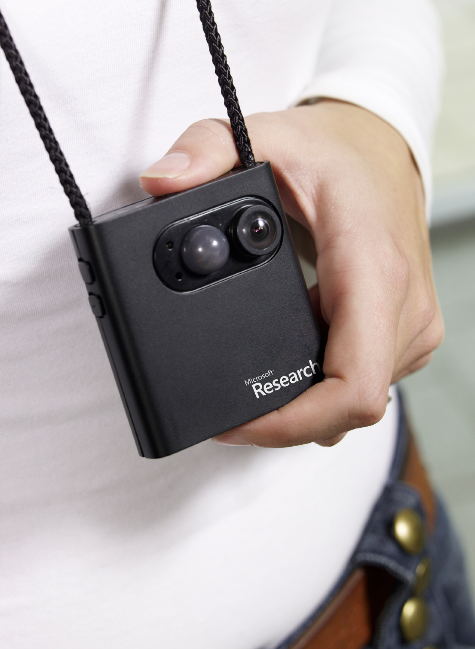Dear diary: I did WHAT!

Microsoft Research is driving a new class of digital device: the lifecorder. It hangs around your neck and records your daily life - including your Saturday night Tequila binge. The days of diary writing are about to be replaced with an explosion of personal pics, video and OMG, I did WHAT!!
Embarrassing pictures on Facebook? You - literally - have seen nothing yet!

MyLifeBits An outgrowth of Gordon Bell's groundbreaking MyLifeBits project, Microsoft's prototype is called the SenseCam. The technology has been licensed to a British company, Vicon, for commercialization.
SenseCam takes still pictures at a set interval, not videos. Looking at the pictures creates a flipbook effect that stimulates your memory, enabling you to recall details that your brain rapidly forgets.
People with Alzheimer's are getting early attention. Testing with SenseCam has found that reviewing pictures of events improves recall and social engagement.
Not just for Alzheimers There are people who can memorize texts the length of 6 Bibles. I'm lucky if I can remember what I wrote last week.
Computers used to "remember" more for you. VMS had a versioning file system: every file save created a new file - FUBAR.ppt;n - where n incremented with each save. A very handy - and mostly forgotten - feature.
How about a SenseCam with face recognition? Look at a photo of person, say their name, and the device labels every picture and whispers their name when they approach. Sign me up!
Of course, some people don't like having their picture taken. But if you are out in public do you have the right to stop it? Maybe not.
But what about a doctor's visit? Would you have a right to record it, even if the doctor disapproved? After all, medical instructions can be complex and memory all too fallible.
And what if your SenseCam records a crime in progress - maybe one you were involved in. Will the police or the courts be able to compel you to give up the pictures?
The Storage Bits take If issues of privacy and legal status - is your SenseCam covered by the 5th Amendment ban on self-incrimination? - can be worked out, I think many people would like the improved memory.
You're at the grocery without a list. What wasn't in the fridge the last time I looked?
Search would be critical as the repository grew. On long winter nights you might grieve over augmented memories of lost loves. Or, "Gee, my pickup lines aren't working - I wonder what I could be doing wrong?" The stories your diary could tell you!
Conservatives will kvetch that these devices will damage the memories of healthy people. They probably said the same thing when writing was invented. They're right and so what?
Kudos to Microsoft Research for this work. Hey, I wonder if someone will write a SenseCam app for the iPhone?
Comments welcome, of course. See my old StorageMojo post Ancient storage technology: the human mind for more on the 6 Bibles-worth of memory.